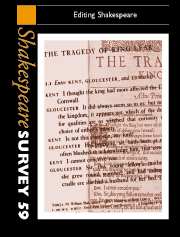Book contents
- Frontmatter
- Editing Shakespeare’s Plays in the Twentieth Century
- Crisis in Editing?
- On Being a General Editor
- Altering the Letter of Twelfth Night: ‘Some are born great’ and the Missing Signature
- ‘A Thousand Shylocks’: Orson Welles and The Merchant of Venice
- The Date and Authorship of Hand D’s Contribution to Sir Thomas More: Evidence from ‘Literature Online’
- Ferdinand’s Wife and Prospero’s Wise
- Editing Stefano’s Book
- Manuscript, Print and the Authentic Shakespeare: The Ireland Forgeries Again
- The Author, the Editor and the Translator: William Shakespeare, Alexander Chalmers and Sándor Petofi or the Nature of a Romantic Edition
- Women Edit Shakespeare
- The Shakespeare Edition in Industrial Capitalism
- Print and Electronic Editions Inspired by the New Variorum Hamlet Project
- The Evolution of Online Editing: Where Will it End?
- The Director as Shakespeare Editor
- The Editor as Translator
- Performance Editions, Editing and Editors
- Editing Collaborative Drama
- Will in the Universe: Shakespeare’s Sonnets, Plato’s Symposium, Alchemy and Renaissance Neoplatonism
- Giants and Enemies of God: The Relationship between Caliban and Prospero from the Perspective of Insular Literary Tradition
- Shakespeare’s Ages
- Who Wrote William Basse’s ‘Elegy on Shakespeare’?: Rediscovering a Poem Lost from the Donne Canon
- ‘Sometime a Paradox’: Shakespeare, Diderot and the Problem of Character
- Shakespeare Performances in England, 2005
- Professional Shakespeare Productions in the British Isles, January–December 2004
- The Year's Contributions to Shakespearian Study 1 Critical Studies
- 2 Shakespeare in Performance
- 3 Editions and Textual Studies
- Index
The Year's Contributions to Shakespearian Study 1 - Critical Studies
Published online by Cambridge University Press: 28 March 2007
- Frontmatter
- Editing Shakespeare’s Plays in the Twentieth Century
- Crisis in Editing?
- On Being a General Editor
- Altering the Letter of Twelfth Night: ‘Some are born great’ and the Missing Signature
- ‘A Thousand Shylocks’: Orson Welles and The Merchant of Venice
- The Date and Authorship of Hand D’s Contribution to Sir Thomas More: Evidence from ‘Literature Online’
- Ferdinand’s Wife and Prospero’s Wise
- Editing Stefano’s Book
- Manuscript, Print and the Authentic Shakespeare: The Ireland Forgeries Again
- The Author, the Editor and the Translator: William Shakespeare, Alexander Chalmers and Sándor Petofi or the Nature of a Romantic Edition
- Women Edit Shakespeare
- The Shakespeare Edition in Industrial Capitalism
- Print and Electronic Editions Inspired by the New Variorum Hamlet Project
- The Evolution of Online Editing: Where Will it End?
- The Director as Shakespeare Editor
- The Editor as Translator
- Performance Editions, Editing and Editors
- Editing Collaborative Drama
- Will in the Universe: Shakespeare’s Sonnets, Plato’s Symposium, Alchemy and Renaissance Neoplatonism
- Giants and Enemies of God: The Relationship between Caliban and Prospero from the Perspective of Insular Literary Tradition
- Shakespeare’s Ages
- Who Wrote William Basse’s ‘Elegy on Shakespeare’?: Rediscovering a Poem Lost from the Donne Canon
- ‘Sometime a Paradox’: Shakespeare, Diderot and the Problem of Character
- Shakespeare Performances in England, 2005
- Professional Shakespeare Productions in the British Isles, January–December 2004
- The Year's Contributions to Shakespearian Study 1 Critical Studies
- 2 Shakespeare in Performance
- 3 Editions and Textual Studies
- Index
Summary
SHAKESPEARE AND THE NEW
I thought of calling this section something like ‘Extravagant Imaginative Dimensions’ in order to convey my sense of Shakespeare criticism’s often tortuous desire these days for originality. Shakespeare’s critics, like his lunatics, lovers and poets, often seem to be of imagination all compact. To take Theseus’s dim view of the workings of the imagination, however, hardly does justice to a deeply imaginative book that seems at first blush to set itself apart from any desire for originality. Yet it is, of course, completely original and I deal with it at the beginning of these reviews to remind us why we should bother to wrack our imaginations on Shakespeare in the first place. Alexander Leggatt’s Shakespeare’s Tragedies: Violation and Identity is a set of meditations on seven of Shakespeare’s tragedies that has been a long time gestating, the interim end-product of an on-going conversation about them with friends and students. Leggatt prises the term ‘thick readings’ away from the company it usually keeps in anthropological and cultural circles in order to describe his ‘close engagement with the plays themselves’ in his attempt to ‘keep them free to do their own thinking’, although the thinking in question is in fact the creatively synthetic thinking of the critic himself.
Leggatt gives us seven bracing chapters on Titus Andronicus, Romeo and Juliet, Hamlet, Troilus and Cressida, Othello, King Lear and Macbeth. They are valuably interconnected. He opens the second chapter, for instance, the one on Romeo and Juliet, with the remark that ‘Romeo’s first meeting with Juliet seems designed not only to begin the love story of Romeo and Juliet but to heal the wounds of Lavinia in Titus Andronicus.’ His concluding chapter begins: ‘We began with Lavinia dehumanised by violence; we end with the death of Macbeth and Lady Macbeth, the perpetrators of violence, humanised.’
- Type
- Chapter
- Information
- Shakespeare Survey , pp. 347 - 368Publisher: Cambridge University PressPrint publication year: 2006
- 1
- Cited by



